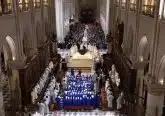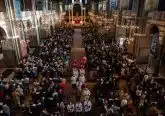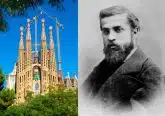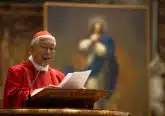‘Simple, not silly’: Children’s questions become book by Pope Francis

IMAGE: CNS photo/courtesy Loyola Press
By Cindy Wooden
VATICAN CITY (CNS) — Children may say the darnedest things, but when it comes to questions about faith they can make even the most learned parents and priests pause.
“These are tough,” Pope Francis said when presented with questions from 30 children from around the world.
Jesuit Father Antonio Spadaro, who went through the questions with the pope, said half the time he personally was stumped when thinking about how he would have responded. But the pope wasn’t.
The questions, illustrated with the drawings of the children aged 6-13, and the pope’s answers will be published March 1 as the book “Dear Pope Francis.”
“What did God do before the world was made?” one child asked. “Do bad people have a guardian angel, too?” asked another.
In the book, coordinated and published by the U.S.-based Loyola Press, Pope Francis responds to those and 28 other queries; some of the questions are theological, others are practical and a few are about the pope personally, including what he wanted to be when he grew up.
To the question about what God was doing before creation, the heart of the pope’s answer is, “Think of it this way: Before creating anything, God loved. That’s what God was doing: God was loving.”
Questions about Jesus, war and peace and about heaven also are included, though Father Spadaro was keeping those exact questions and answers under wraps during a late January interview.
Some of the personal questions made Pope Francis laugh and the pope’s answers to those questions made Father Spadaro laugh, the Jesuit said. The pope admits in the book that when he was small he wanted to be a butcher because the butcher his grandmother bought meat from had an apron with a big pocket that seemed to be full of money.
The children’s questions are “simple, but not silly,” said Father Spadaro, who discussed them with Pope Francis and recorded his answers.
Father Spadaro heads La Civilta Cattolica, a Jesuit journal filled with articles on philosophy, theology, literary criticism and political theory. He has never worked with young children and said he was in awe of how the pope handled the questions — taking them seriously and responding to them honestly and clearly.
Some of the pope’s answers, he said, are “inspired.”
“This is important,” Father Spadaro said. “It says a lot about the magisterium of Pope Francis; he knows his ministry can reach children.”
At the request of Loyola Press, Father Spadaro asked Pope Francis last May if he would be willing to do the book. The Jesuit publishing house had asked Father Spadaro to approach the pope since he had conducted the first big interview with Pope Francis in 2013.
“The pope said yes immediately and with enthusiasm,” Father Spadaro said.
Loyola Press then reached out to dozens of Jesuits and collaborators around the globe, asking them to solicit questions and drawings from children. Sometimes Loyola had to ship off crayons, markers and paper because the children had none.
In the end, 259 children in 26 countries submitted questions. The big batch of letters are in 14 languages and come from children in wealthy cities, poor rural areas and even refugee centers.
Choosing which letters the pope would answer in the book was done with input from the children, parents, grandparents, teachers and Jesuits, Father Spadaro said. But he went into the reserve pile and pulled out a few more as well.
In August, Father Spadaro read the letters out loud to the pope in Italian, but the pope also scrutinized the drawings, the Jesuit said. He commented on the scenes and colors and often had a good laugh over the way the kids drew the pope.
For the answers, “I was not just taking dictation,” Father Spadaro said. The pope enjoys a conversation; for the book, that meant the pope would sometimes discuss the questions and potential answers with the Jesuit scribe and, often, would return to add something to an answer after they had already moved on to other letters.
“He’s a volcano,” Father Spadaro said.
The pope would look off into space as if picturing the children and responding to them in person, usually in Spanish, but sometimes in Italian, the Jesuit said.
The questions stayed with the pope, who later referred to some of them in speeches and homilies, he said. The most noticeable example was the question from 8-year-old Ryan in Canada about what God was doing before creation.
In the pope’s unscripted talk at the Festival of Families in Philadelphia in September, Pope Francis told the crowd, “A young person once asked me — you know how young people ask hard questions! — ‘Father, what did God do before he created the world?'”
“Believe me, I had a hard time answering that one,” the pope admitted in Philadelphia. “I told him what I am going to tell you now. Before he created the world, God loved, because God is love.”
Although it might not be “theologically precise,” the pope said that night, God’s love was so great that “he had to go out from himself, in order to have someone to love outside of himself. So God created the world. … But the most beautiful thing God made — so the Bible tells us — was the family.”
Pope Francis will have a chance to meet nine or 10 of the children in late February when he has promised a private audience for some of the people who took part in the project.
– – –
Copyright © 2016 Catholic News Service/U.S. Conference of Catholic Bishops. www.catholicnews.com. All rights reserved. Republishing or redistributing of CNS content, including by framing or similar means without prior permission, is prohibited. You may link to stories on our public site. This copy is for your personal, non-commercial use only. To request permission for republishing or redistributing of CNS content, please contact permissions at [email protected].













